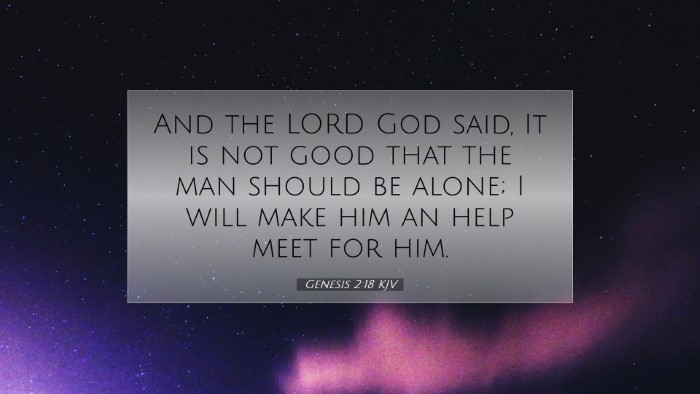Commentary on Genesis 2:18
Verse: "And the LORD God said, It is not good that the man should be alone; I will make him an help meet for him." (Genesis 2:18)
Introduction
The creation narrative in Genesis reveals profound insights into God’s design for humanity. Genesis 2:18 marks a pivotal moment in this narrative, where God himself declares something as “not good.” This commentary synthesizes insights from prominent public domain commentators to illuminate the theological, social, and relational implications of this verse.
The Divine Declaration
Matthew Henry notes that the phrase "It is not good" signifies a departure from the perfection seen in the preceding creations. While God’s creation was good in all its stages up to this point, the solitude of man lacked completeness. The recognition of this need underscores humanity's inherent design for relationship.
Implications of Solitude
Albert Barnes emphasizes the importance of companionship. The isolation of man was not merely a physical condition but a spiritual and emotional one as well. Adam's solitude could not fulfill his needs — not just for tasks but for relational connection. The absence of a suitable partner highlighted a fundamental human need for community, reflecting the nature of God himself — a relational being triune in essence.
God's Purposeful Creation of a Helper
In the latter part of the verse, the phrase "I will make him an help meet for him" signifies God's proactive approach in addressing Adam’s loneliness. Adam Clarke elaborates that the term "help meet" indicates a helper corresponding to Adam in quality and dignity, not one inferior or subordinate, but a companion appropriate to his nature.
The Nature of the Helper
- Equality: The helper is of equal status to man, created from his side, illustrating partnership rather than hierarchy.
- Complementarity: This helper complements Adam's strengths and weaknesses, suggesting that both genders have unique contributions within their union.
- Interdependence: The creation of the woman from the man signifies an intrinsic relationship that relies on interdependence, a core aspect of all human relationships.
Theological Reflections
This verse prompts deep theological reflections about God’s nature. As God recognizes the man’s need for companionship, it implies that the desire for community is woven into the fabric of creation itself. The triune God’s relational aspect is mirrored in His creation of humanity.
Theological Themes
- Imago Dei: Humanity, made in the image of God, reflects relational aspects of the Trinity, suggesting that relationships are fundamental to human nature.
- Covenantal Relationships: The need for suitable companionship foreshadows future covenantal relationships, notably marriage, which becomes a central theme throughout Scripture.
- Community and Society: This foundational verse establishes the need for community not only in the context of marriage but also in broader societal relationships.
Practical Implications for Today
For pastors and theologians, Genesis 2:18 serves as a profound reminder of the vital importance of relationships in ministry and church life. Just as God determined that Adam needed a companion, modern believers also require community and support systems for spiritual growth.
Application in Ministry
- Fostering Community: Churches should prioritize creating environments where relationships are nurtured and fostered.
- Encouraging Marital Harmony: Pastoral teachings should emphasize the importance of marriage as a partnership grounded in mutual support and equality.
- Addressing Loneliness: Ministries must address the rising loneliness in contemporary society, echoing God’s concern for human connection.
Conclusion
Genesis 2:18 encapsulates the essence of humanity’s relational need as divinely ordained by God. This verse, revealing God’s recognition of Adam’s loneliness, affirms that relationships are essential to human existence. Through the lens of this scripture, believers are called to embrace God’s design for companionship and community, reflecting the relational nature of the Creator in their lives.


